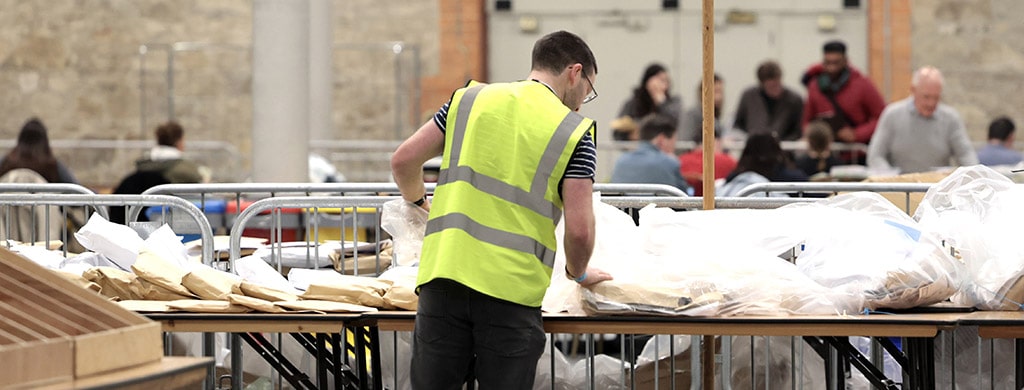 Counting in the 2024 referendums on family and care
(Pic: RollingNews.ie)
Counting in the 2024 referendums on family and care
(Pic: RollingNews.ie)
‘Remove pre-vote broadcast moratorium’ call
The Electoral Commission (An Coimisiún Toghcháin) has recommended that a moratorium period on broadcast coverage of elections and referendum campaigns should be removed.
The measure is one of five recommendations made by the commission in a report on how it performed its functions during the referendums on family and care earlier this year.
Guidelines provided by Coimisiún na Meán (CnaM) currently tell radio and television broadcasters to observe a moratorium on coverage of an electoral event from 2pm the day before the event until the close of polls, but this does not apply to apply to online media or social media.
“At a time when online media and social media are so prevalent, these guidelines are now anomalous and open to potential exploitation,” its report states, calling for the removal of the mortatorium “before the next electoral event”.
CnaM has committed to carrying out a review of the broadcast moratorium this year.
Booklets
The report says that the Government should publish any proposed constitutional amendment no later than 16 weeks before the proposed polling day.
It believes this will give it enough time to ensure that information booklets are delivered to each household two to three weeks before polling day. The publication of the bills on the family and care referendums gave the commission 13 weeks.
The commission also calls for the polling-day order for a referendum to give a minimum of 60 days’ notice of polling day.
The current minimum timeframe is set at 30 days.
Its report also recommends a review of the design of ballot papers before the next referendum, describing the lay-out in the 2024 votes as “not sufficiently clear”.
Funding question
The electoral body also wants changes in how it is funded, arguing that its funding should come directly from the Exchequer.
Currently, requests for this funding for referendum campaigns must go to the Department of Public Expenditure and Reform, through the Department of Housing, Local Government and Heritage, on an annual basis.
“A question now arises in relation to the appropriateness of the executive controlling the resources of An Coimisiún, the body charged with specific electoral functions and independent oversight of the electoral process,” the report states.
‘Durable relationships’
The family and care votes represented the commission’s first electoral outing since it was set up last year under the Electoral Reform Act 2022.
In the report, the commission highlighted the absence of any proposal for a legislative definition of ‘durable relationships’, a phrase included in the wording of the proposal to broaden the definition of the family in the Constitution.
The body said that this absence, and the lack of any intended or anticipated changes that might be considered to legislation in the areas of social welfare, taxation, succession and immigration, “gave rise to uncertainty amongst the electorate as to the concrete effect of the proposed change to the definition of the family”.
Gazette Desk
Gazette.ie is the daily legal news site of the Law Society of Ireland